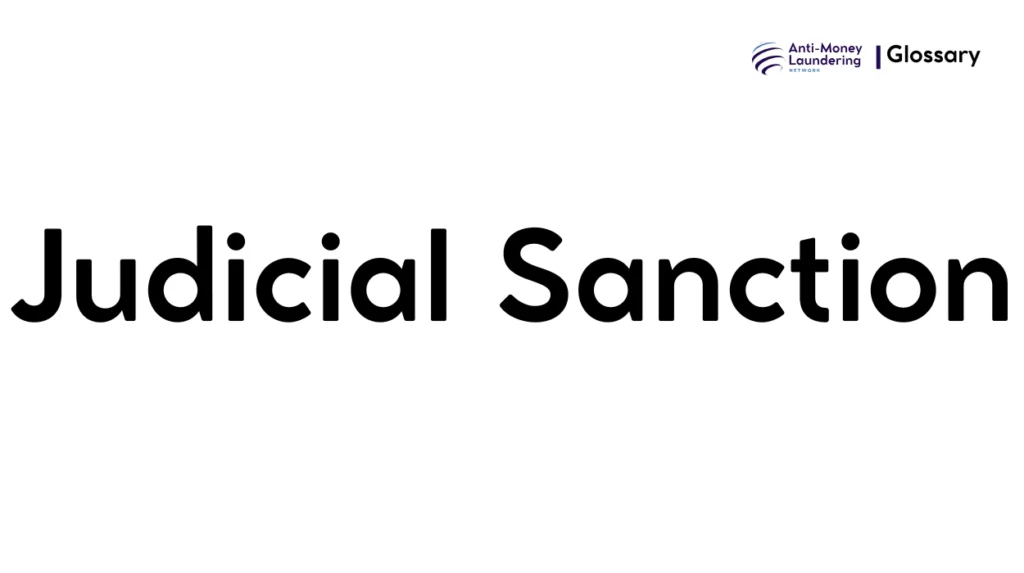Definition
In Anti-Money Laundering (AML), Judicial Sanction refers to the formal approval or authorization granted by a court or judicial authority allowing a law enforcement agency or financial regulatory body to undertake specific AML-related actions. These actions may include freezing or confiscating assets, issuing search or arrest warrants, or authorizing investigations pertaining to suspected money laundering, terrorist financing, or related financial crimes. Judicial sanction is a critical legal mechanism ensuring that AML enforcement measures comply with due process and legal oversight.
Purpose and Regulatory Basis
The role of judicial sanction in AML is to balance robust law enforcement against financial crime with protection of individual rights and rule of law principles. It establishes a legal checkpoint so that AML measures affecting privacy, property, or liberty are undertaken only with proper judicial scrutiny.
Key Global and National Regulations
- Financial Action Task Force (FATF) Recommendations emphasize that AML investigations and enforcement involving asset freezing or confiscation must be supported by appropriate legal authority, which often includes judicial sanction.
- The USA PATRIOT Act requires court orders or judicial approvals for certain surveillance and asset seizure activities in combating terrorism financing and money laundering.
- The European Union Anti-Money Laundering Directives (AMLD) mandate judicial or administrative authorization for precautionary measures like freezing funds or suspending transactions to prevent misuse of the financial system.
- National laws often codify judicial sanction requirements, making them indispensable steps before conducting intrusive AML actions.
When and How it Applies
Judicial sanction applies in AML in scenarios such as:
- Freezing or seizing assets suspected to be proceeds of crime or related to terrorist financing.
- Authorizing searches and seizures of documents or electronic data during AML investigations.
- Permitting arrest or detention related to money laundering offenses.
- Approving the interception of communications in complex money laundering schemes.
For example, when a financial institution reports suspicious transactions, and authorities identify illicit proceeds, they may seek judicial sanction before freezing the suspect’s bank accounts.
Types or Variants
Judicial sanctions in AML vary according to jurisdiction and nature of the action:
- Freezing Orders: Court approval required to prevent disposal or transfer of assets.
- Search Warrants: Authorization to enter premises and seize evidence.
- Confiscation Orders: Final judicial decree to permanently forfeit criminally derived assets.
- Arrest Warrants: Court permission to detain suspects under money laundering laws.
- Communication Interception Orders: Order for surveillance during investigation.
Some jurisdictions differentiate between temporary judicial sanctions (e.g., freezing orders) versus permanent ones (e.g., confiscation).
Procedures and Implementation
Institutions and authorities must follow defined steps to comply with judicial sanction requirements:
- Submission of evidence-based requests by investigating authorities to courts.
- Courts review the legality, necessity, and proportionality of the requested action.
- Issuance of formal written judicial sanction documents specifying the scope and duration of the action.
- Notification and record-keeping by enforcement bodies and financial institutions.
- Integration of judicial sanction controls into AML compliance systems to ensure actions like asset freezes are legally authorized.
Financial institutions should incorporate judicial sanction verification in their transaction monitoring and suspicious activity reporting workflows.
Impact on Customers/Clients
From a customer’s perspective, judicial sanctions can impose significant restrictions:
- Account freezes or transaction blocks limit access to funds.
- Legal processes may subject clients to investigations or prosecution.
- Customers have the right to challenge judicial sanctions through legal recourse.
- Institutions must maintain confidentiality but also inform clients as per legal guidelines.
These measures, while necessary for public and financial security, can affect customer trust and require sensitive communication.
Duration, Review, and Resolution
Judicial sanctions typically have defined durations subject to review:
- Initial sanctions may be temporary, pending investigation outcomes.
- Authorities must apply for extensions or confirmatory approvals to continue the measures.
- Once investigations conclude, courts may decide to lift sanctions, impose penalties, or order confiscation.
- Regular review mechanisms ensure sanctions remain justified and proportional.
Institutions must keep monitoring judicial sanction statuses to comply with evolving legal obligations.
Reporting and Compliance Duties
Financial institutions and regulated entities bear multiple responsibilities:
- Report actions taken under judicial sanctions to regulators and enforcement agencies.
- Maintain detailed records of sanctioned transactions and related client information.
- Conduct ongoing due diligence to detect attempts to circumvent sanctions.
- Face penalties for non-compliance, including heavy fines and reputational damage.
Institutions often implement automated AML systems integrated with legal and regulatory databases to track sanctions and judicial orders.
Related AML Terms
- Sanctions Screening: Identifying individuals/entities subject to restrictions.
- Asset Freezing/Confiscation: Enforcement actions enabled by judicial sanction.
- Suspicious Activity Reporting (SAR): Reporting financial anomalies linked to sanctions.
- Know Your Customer (KYC): Customer identification underpinning legal sanction decisions.
Judicial sanction is a cornerstone ensuring these related AML activities comply with legal standards.
Challenges and Best Practices
Common challenges include:
- Delays in obtaining timely judicial sanctions impacting enforcement speed.
- Complexity in cross-border judicial cooperation and recognition of foreign sanctions.
- Balancing rapid AML response with due process protections.
Best practices recommend:
- Clear legal frameworks and guidelines for judicial sanction application.
- Training for compliance officers on judicial sanction procedures.
- Use of technology to streamline court requests and tracking.
- Coordinated international legal cooperation.
Recent Developments
Recent AML trends include:
- Increasing judicial involvement in digital asset and cryptocurrency AML cases.
- Enhanced use of technology and AI for faster judicial sanction processing.
- Greater emphasis on human rights compliance in sanction enforcement.
- Digital court systems improving transparency and timeliness of sanctions.
Regulatory bodies continue refining judicial sanction protocols to address evolving AML risks and technological advancements.
Judicial sanction in Anti-Money Laundering is a legally mandated court approval ensuring that intrusive AML enforcement actions comply with due process and the rule of law. It serves as a crucial safeguard between aggressive financial crime prevention and the protection of individual rights. Understanding and effectively implementing judicial sanction processes is vital for compliance officers and financial institutions to manage risks and uphold regulatory standards globally.

